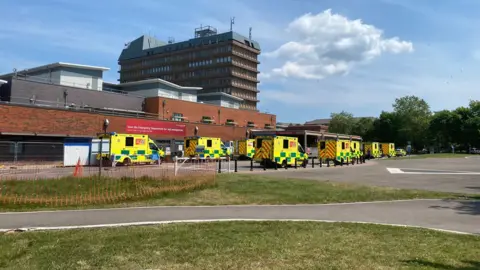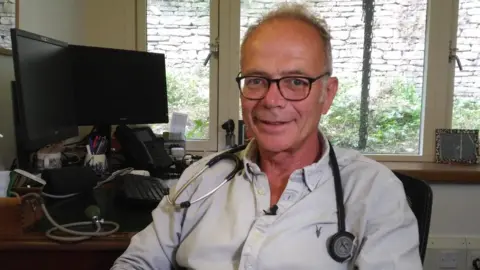Ambulance service misses response time targets
 BBC
BBCAn ambulance service has missed all its response time targets in Gloucestershire.
For Category 2 incidents, which include patients suffering burns, epilepsy and strokes, the target is 18 minutes - but the average wait in the county between April and June was 41 minutes.
South Western Ambulance Service NHS Foundation Trust (SWASFT) said the problem was in part caused by ambulances queueing outside Gloucestershire Royal Hospital, meaning they could not get to their next job.
The NHS Integrated Care Board (ICB) said it recognised people were waiting longer than they should be but said response times had recovered to a more stable position.
SWASFT data covering the period between April and June in Gloucestershire showed:
- For Category 1 incidents, such as cardiac arrest, it took an average of 10 minutes for an ambulance to get to someone - the target is eight minutes
- With Category 2 incidents, such as a strokes, ambulances took an average of 41 minutes, when it should be 18
- It took ambulances an average of 132 minutes to get to someone for Category 3 incidents - such as early stages of labour - against a target of 120 minutes
Some people in rural areas of the county had to wait more than an hour for an ambulance responding to category 2 calls.
The data also showed response times had got worse in all three categories, when compared to the previous three months.
'We need reassurance'
Councillor Paul Hodgkinson, who sits on Gloucestershire County Council's health scrutiny committee, said: "This whole thing is going round in circles, it's not getting better."
He added: "People have to be reassured on this because any of us could call for an ambulance, any one of us could fall ill, this could be any one of us.
"We need reassurance that these figures are going to get significantly better because at the moment they're getting worse."
Dr Simon Opher, Stroud MP and GP, said the delay stemmed from hospital beds being used by patients who could potentially be discharged home or into community care.
"That's the problem so we need to unblock that," he added.

An ICB spokesperson said health and social care teams were working together to free up the system, but there was "more to do".
They said: “We recognise that currently too many people are waiting longer than they should and that more needs to be done, which is why partners across health and care are working together to ensure the journey in and out of hospital is as smooth as it can be.
The spokesperson added that a new integrated flow hub at Gloucestershire Royal Hospital was "supporting timely care, improving decision making and significantly reducing the time it takes to get people out of hospital, when appropriate".
Follow BBC Gloucestershire on Facebook, X and Instagram. Send your story ideas to us on email or via WhatsApp on 0800 313 4630.
